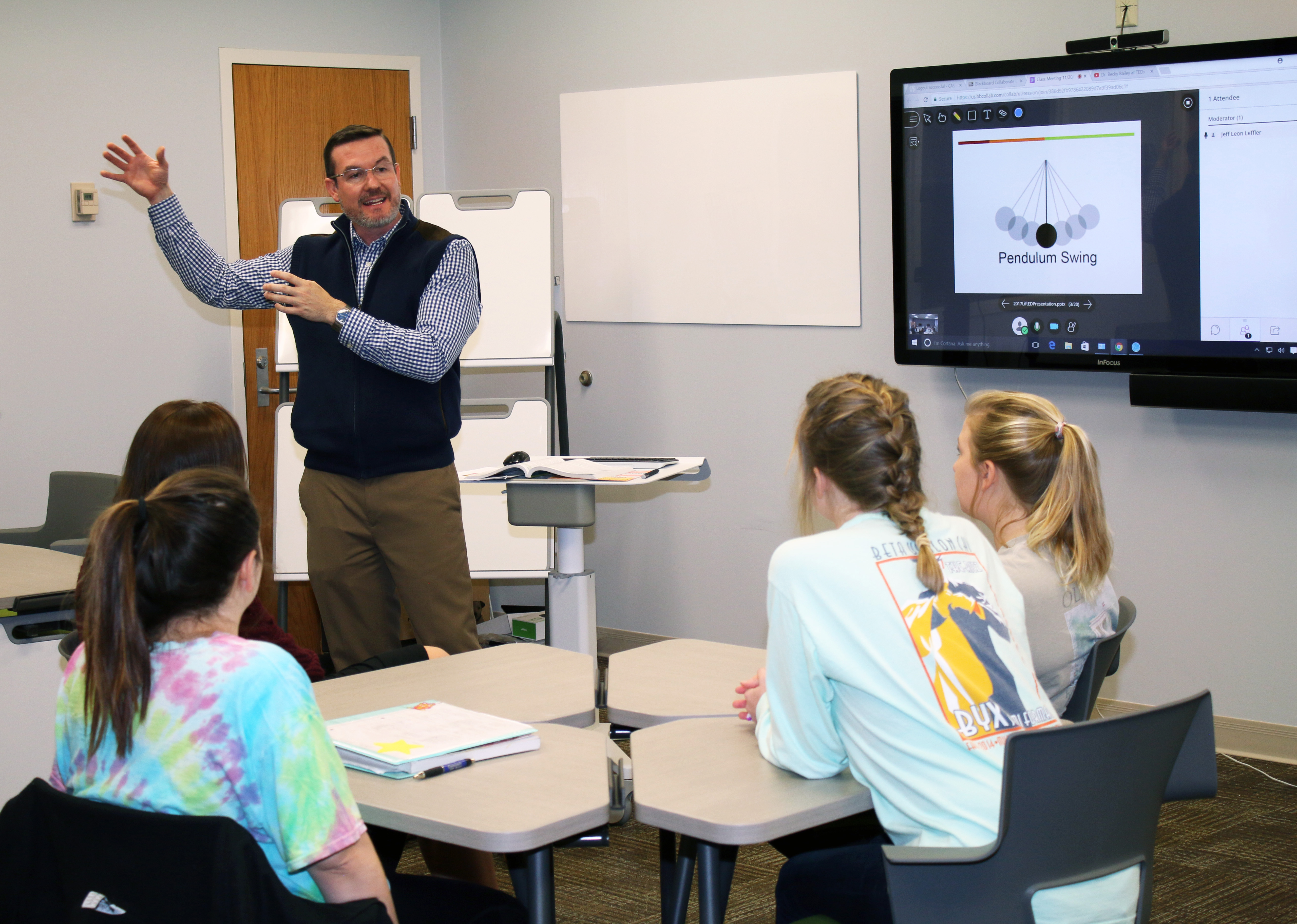 MERIDIAN - Blended classes are emerging at Mississippi State University-Meridian, allowing students who cannot attend every physical class to participate remotely when they can’t make it to campus.
MERIDIAN - Blended classes are emerging at Mississippi State University-Meridian, allowing students who cannot attend every physical class to participate remotely when they can’t make it to campus.
A classroom on the College Park Campus is equipped with a video camera that can home in on the instructor’s face and a Smartboard that can transmit writing — along with other equipment that allows students from remote locations to participate in the class.
The room also harbors four workstations that allow students to connect their own devices and make their writing visible to the class, including to students participating off-campus.
The newly wired classroom, called “The Collaboratory,” will be fully functional for the spring semester, and right now students are beginning to use the room as the final pieces are put into place. Next semester, the room will be used for graduate classes in the Division of Education, along with students in the university’s PANTA initiative, which stands for Professional Advancement Network for Teacher Assistants. These are students who work as teacher assistants, and possibly other school positions, and who are returning to receive education degrees that will allow them to teach.
Upon graduation, PANTA participants “receive a bachelor of science degree in elementary education, with concentrations either in early childhood or middle-level education,” according to a report on the MSU-Meridian website. They also complete a study program that leads to licensure.
Jeff Leffler, assistant professor of elementary education and director of Graduate Studies for MSU-Meridian’s Division of Education, said the blended model is especially important for graduate students in education.
“In education, our students are teachers, so they’re working all day long,” he said.
Leffler said staff members try to create schedules that concentrate classes into convenient clusters, but distance can still prevent people from attending consistently.
“We have people who come to this campus — and we also have people who want to come to this campus — who live an hour or more away,” Leffler said. “And so if you get off of work after school and then try to be here for a four o’clock class, the geography gets in the way of being able to do that.”
Leffler said, too, that the classroom may be used beyond the Division of Education, by any MSU-Meridian faculty members who believe the technology can enhance their classes, in coming semesters. He noted, however, a particularly acute demand to reach prospective education students, given the need for teachers in the area.
“There is a huge demand for teachers in the area,” he said, noting several districts in the area that are considered “geographic shortage areas” for teachers
“This is another way that we’re trying to make what we’re doing here a little more accessible,” he said.
Kevin Matthew Bogan, working on his educational specialist’s degree in secondary education, took a course called “Special Education in the Regular Classroom” last summer at Riley Campus downtown in a kind of pilot program to test the blended approach. Bogan praised the technology and noted the way it helped students to take classes from a remote location. For the students who attended the physical classroom, he said, it also offered perspectives from students from other parts of the state. One student, he said, took the class from Gulfport.
“It’s always good to get a fresh perspective from someone else who’s not in this particular region,” he said. Those perspectives can be particularly helpful, he said, when the discussion turns to state education policies.
Leffler said there were no immediate plans to use the classroom for traditional undergraduate education students, but that, he said, could change in future semesters.
Leffler noted another room, just across the hallway, that has many of the same capabilities as The Collaboratory and will also be used as a blended classroom. A third classroom that allows for blended classes exists on the Riley Campus downtown. The Collaboratory, however, is the most sophisticated. It’s the only MSU-Meridian classroom, for instance, with a Smartboard that allows students in remote locations to follow the writing of the instructor electronically.
Katlyn Mosley, a junior and an elementary education major at MSU-Meridian, said the blended model is particularly helpful to accommodate work schedules.
“I work part-time, and it’s helpful if I have to go into work on short notice … that we have that option,” she said.
Mosley noted, too, that there's a pressing need for teachers in the area, and she said some prospective teachers have developed concerns after hearing stories of behavioral problems. Mosley said she’s observed classes in the Meridian Public School District.
“The stories can scare people, but once you get in there and you start to get to know the kids, they are sweet,” she said. “They’re some of the best kids you’ll ever work with.”
Story by Michael Neary – The Meridian Star